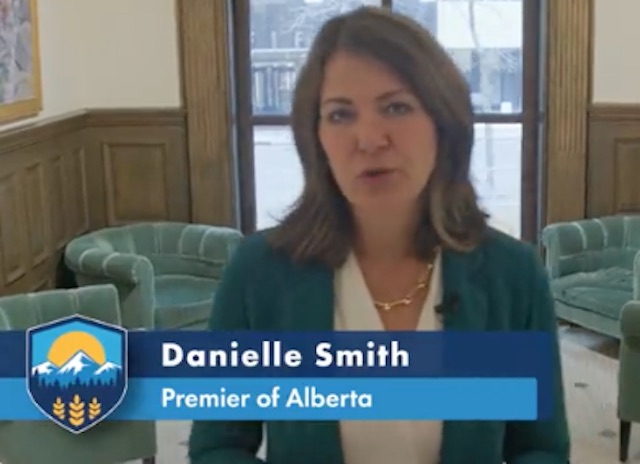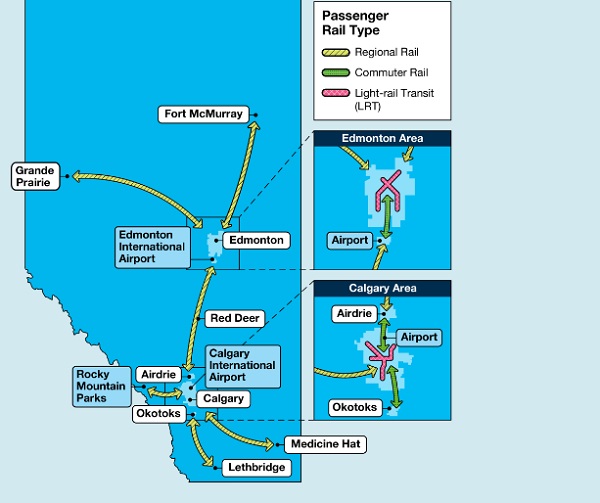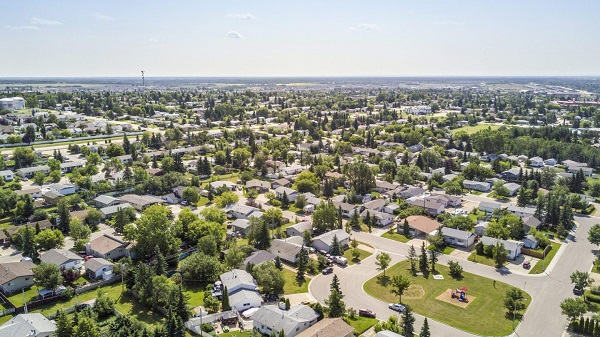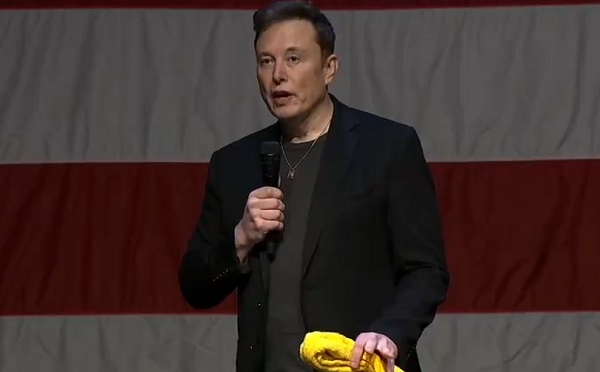Alberta
Premier Smith urges Canadians to contact their MP’s to demand reliable & affordable power

“What would happen if your power went out and it’s minus 30 outside”? This question is posed to Albertans and all Canadians by Premier Danielle Smith. Premier Smith has been chastised by the opposition NDP and supporters of Prime Minister Justin Trudeau’s plan to make Canada’s electricity grid completely carbon neutral by 2035.
Smith says Trudeau’s net zero strategy is a terrible mistake that will lead to brutal power outages while potentially quadrupling the cost of energy. Further, since wind and solar generation depends on sunlight and a good breeze, renewable energy can’t always be relied on. To make that clear Smith pointed to eight different occasions in the past year when Alberta’s electricity system nearly collapsed.
While repeating her pledge to make Alberta’s power grid carbon neutral by 2050, Smith is urging Canadians to join her in support of a more reasonable plan for energy transition.
No one in Canada should be without access to electricity, but if the feds don’t smarten up they will put all of us at risk.
Take 30 seconds and send a message to our Liberal-NDP government in Ottawa 👉https://t.co/GmBSkeaXs6 pic.twitter.com/ZwDpQ2o2nQ
— Danielle Smith (@ABDanielleSmith) October 16, 2023
From TellTheFeds.ca
No one wants blackouts.
What Canadians want is reliable & affordable power.
Ottawa’s proposed electricity regulations will make electricity unreliable & unaffordable.
THE THINGS CANADIANS COUNT ON WON’T WORK WHEN NEEDED.
Affordable electricity matters.

In addition to blackouts, current electricity rates will be double, triple or even quadruple depending on the province. And drastic changes could dismantle thriving industries that are vital parts of our provincial economies, resulting in a power grid that depends on unreliable energy.
Canada can’t afford a hasty transition.

Reliable electricity matters.
With cited cost estimates as high as $1.7 trillion*, the cost of achieving a net zero grid by 2035 will leave our power grid dependent on intermittent and unreliable sources like solar and wind.
Imagine no heat at -30°, and no power for the Internet or to charge your phone.
The federal government wants electricity demand to at least double by 2050. Tell the Feds reliable and affordable electricity matters. And ask them why they are rushing to do something by 2035 when the experts agree that it can’t feasibly be done.
* Source: Public Policy Forum, Project of the Century, July 2023
Tell the Feds what you want.
Contact your MP.
There is a better path forward. Alberta is leading the way. Together, let’s make a better plan.
Not a mandate.
Ottawa’s carbon-neutral goals can be achieved by 2050 with a lower tax and utility burden on Canadians. Changing over our electricity system in 27 years is much more practical and affordable than rushing to do it in just 12 years. Rather than being told to dismantle industries critical to Canada’s economy, Tell the Feds to work with the provinces on a plan that benefits all Canadians.
Alberta
Passenger rail experts from across the world to inform Alberta’s Passenger Rail Master Plan

Alberta’s future runs on rails
Alberta’s government is bringing together passenger rail experts from across the world to share best practices and inform the province’s Passenger Rail Master Plan.
As Alberta experiences record growth and evolving transportation needs, passenger rail infrastructure and services will be vital for enhancing accessibility and connecting communities. To support this, Alberta’s government is developing a Passenger Rail Master Plan to build the optimal passenger rail system for the province.
As part of the development of the plan, Alberta’s government is hosting a one-day forum to provide an opportunity for Alberta communities, industry and experts to collaborate and share information on passenger rail opportunities and challenges. The forum includes experts from Ontario, Quebec, California, Italy, Spain and Japan who are involved in passenger rail procurement, governance and operations. The sessions will allow for the sharing of best practices and lessons learned on passenger rail planning and development.
“Alberta was built by innovators and visionaries who saw potential in our province and its people. They believed that if you could dream it, you could achieve it. We believe there is opportunity and demand for passenger rail services in Alberta. Today’s forum marks an important step forward in the development of our Passenger Rail Master Plan and in achieving our vision for passenger rail.”
In line with the province’s commitment to engaging Albertans throughout the development of the Passenger Rail Master Plan, a survey has been launched to seek public input on passenger rail. Albertans are invited to complete the online survey by Dec. 20 to help shape the future of passenger rail in Alberta. There will be additional opportunities for Albertans to have their say on passenger rail in the future, including regional open houses which will be held in early 2025.
“Feedback from Albertans, Alberta municipalities, Indigenous communities and industry will be critically important to developing passenger rail services in Alberta. I encourage all Albertans to complete the online survey to help inform a shared vision for passenger rail to enhance accessibility, efficiency, and connectivity across the province.”
In April 2024, Alberta’s government shared its vision for passenger rail and announced the development of the Passenger Rail Master Plan for Alberta. The province’s vision is for an Alberta passenger rail system that includes public, private or hybrid passenger rail, including:
- a commuter rail system for the Calgary area that connects surrounding communities and the Calgary International Airport to downtown
- a commuter rail system for the Edmonton area that connects surrounding communities and the Edmonton International Airport to downtown
- passenger rail that runs between Calgary and Edmonton and the Rocky Mountain parks
- a regional rail line between Calgary and Edmonton, with a local transit hub in Red Deer
- municipal-led LRT systems in Calgary and Edmonton that integrate with the provincial passenger rail system
- rail hubs serving the major cities that would provide linkages between a commuter rail system, regional rail routes and municipal-led mass transit systems
The vision includes a province-led “Metrolinx-like” Crown corporation with a mandate to develop the infrastructure and oversee daily operations, fare collection/booking systems, system maintenance, and planning for future system expansion.
Quick facts
- The Passenger Rail Survey will be open until Dec. 20.
- Alberta’s Passenger Rail Master Plan is expected to be completed by summer 2025 and will include:
- a comprehensive feasibility assessment
- financial and delivery model options
- governance and operations recommendations
- a 15-year delivery plan
- public engagement
Related information
Alberta
REPORT: Alberta municipalities hit with $37 million carbon tax tab in 2023

Grande Prairie. Getty Images photo
From the Canadian Energy Centre
Federal cash grab driving costs for local governments, driving up property taxes
New data shows the painful economic impact of the federal carbon tax on municipalities.
Municipalities in Alberta paid out more than $37 million in federal carbon taxes in 2023, based on a recent survey commissioned by Alberta Municipal Affairs, with data provided to the Canadian Energy Centre.
About $760,000 of that came from the City of Grande Prairie. In a statement, Mayor Jackie Clayton said “if the carbon tax were removed, City property taxes could be reduced by 0.6 per cent, providing direct financial relief to residents and businesses in Grande Prairie.”
Conducted in October, the survey asked municipal districts, towns and cities in Alberta to disclose the amount of carbon tax paid out for the heating and electrifying of municipal assets and fuel for fleet vehicles.
With these funds, Alberta municipalities could have hired 7,789 high school students at $15 per hour last year with the amount paid to Ottawa.
The cost on municipalities includes:
Lloydminster: $422,248
Calgary: $1,230,300 (estimate)
Medicine Hat: $876,237
Lethbridge: $1,398,000 (estimate)
Grande Prairie: $757,562
Crowsnest Pass: $71,100
Red Deer: $1,495,945
Bonnyville: $19,484
Hinton: $66,829
Several municipalities also noted substantial indirect costs from the carbon tax, including higher rates from vendors that serve the municipality – like gravel truck drivers and road repair providers – passing increased fuel prices onto local governments.
The rising price for materials and goods like traffic lights, steel, lumber and cement, due to higher transportation costs are also hitting the bottom line for local governments.
The City of Grande Prairie paid out $89 million in goods and services in 2023, and the indirect costs of the carbon tax “have had an inflationary impact on those expenses” in addition to the direct costs of the tax.
In her press conference announcing Alberta’s challenge to the federal carbon tax on Oct. 29, 2024, Premier Danielle Smith addressed the pressures the carbon tax places on municipal bottom lines.
“In 2023 alone, the City of Calgary could have hired an additional 112 police officers or firefighters for the amount they sent to Ottawa for the carbon tax,” she said.
In a statement issued on Oct. 7, 2024, Ontario Conservative MP Ryan Williams, shadow minister for international trade, said this issue is nationwide.
“In Belleville, Ontario, the impact of the carbon tax is particularly notable. The city faces an extra $410,000 annually in costs – a burden that directly translates to an increase of 0.37 per cent on residents’ property tax bills.”
There is no rebate yet provided on retail carbon pricing for towns, cities and counties.
In October, the council in Belleville passed a motion asking the federal government to return in full all carbon taxes paid by municipalities in Canada.
The unaltered reproduction of this content is free of charge with attribution to the Canadian Energy Centre.
-

 Brownstone Institute1 day ago
Brownstone Institute1 day agoThe Most Devastating Report So Far
-

 Economy2 days ago
Economy2 days agoCOP 29 leaders demand over a $1 trillion a year in climate reparations from ‘wealthy’ nations. They don’t deserve a nickel.
-

 Censorship Industrial Complex1 day ago
Censorship Industrial Complex1 day agoAnother Mass Grave?
-

 ESG15 hours ago
ESG15 hours agoCan’t afford Rent? Groceries for your kids? Trudeau says suck it up and pay the tax!
-

 Alberta1 day ago
Alberta1 day agoMAiD In Alberta: Province surveying Albertans about assisted suicide policies
-

 Energy2 days ago
Energy2 days agoOttawa’s proposed emission cap lacks any solid scientific or economic rationale
-

 Alberta2 days ago
Alberta2 days agoOn gender, Alberta is following the science
-

 International16 hours ago
International16 hours agoElon Musk praises families on X: ‘We should teach fear of childlessness,’ not pregnancy


